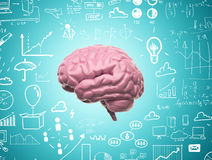 Recently, neurosurgeon Michael Egnor offered a parable about whether machines really learn. The tale features a book that “learned” to fall open at the right places. Computer scientist Jeffrey Shallit responded, claiming that machines really CAN learn!, and Dr. Egnor responded to him, pointing out that a baseball glove can “learn” the game if adjustment to circumstances is all we are counting.
Recently, neurosurgeon Michael Egnor offered a parable about whether machines really learn. The tale features a book that “learned” to fall open at the right places. Computer scientist Jeffrey Shallit responded, claiming that machines really CAN learn!, and Dr. Egnor responded to him, pointing out that a baseball glove can “learn” the game if adjustment to circumstances is all we are counting.
But he also wanted to make clear to Dr. Shallit, brains don’t learn either. Only minds learn:
Shallit implies that the reinforcement and suppression of neural networks in the brain that accompanies learning means that brains, like machines, learn. He is mistaken. Brains are material organs that contain neurons and glia a host of cells and substances. Brains have action potentials and neurotransmitters.
Brains are extraordinarily complex, and brain function is a necessary condition for ordinary mental function.
But brains don’t have minds, and brains don’t have knowledge, and brains don’t learn. Reinforcement and suppression of neural networks in the brain are not learning. They are a necessary condition for learning, but learning is an ability of human beings, considered as a whole, to acquire new knowledge, not an ability of human organs considered individually. Human organs don’t “know” or “learn” anything. This error is the mereological fallacy. It is the same mereological fallacy [mistaking the part for the whole] to say that my brain learns as it is to say that my lungs breathe or my legs walk. I learn and I breathe and I walk, using my brain and lungs and legs… Michael Egnor, “Do either machines—or brains—really learn? A further response to Jeffrey Shallit” at Mind Matters Today
See also: Can machines really learn? Michael Egnor offers a parable.
Machines really CAN learn! A computer scientist responds to my parable
Also: Inner peace: Is there software for that? Tech billionaire funds neuroscience in a search for the secret of contentment
and
Google is collecting data on schoolkids. Some say it’s okay because the firm supplies a lot of free software and hardware to schools
Children are watching much less TV. But what we learned from children’s TV is coming back to haunt us.
Will AI triumph? Will that phone end up smarter than your kid? If so, it might not happen in quite the way we are told to fear. U.S. kids who spend more than two hours a day looking at screens “perform worse on memory, language and thinking tests than kids who spend less time in front of a device.”